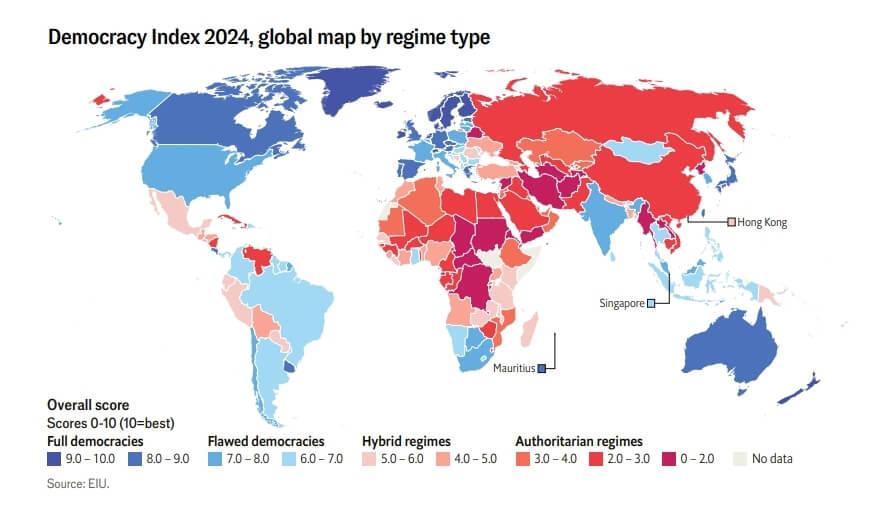Taiwan remained at the top of Asia and 12th globally among 167 countries and territories in the Democracy Index 2024, which was released today by the London-based Economist Intelligence Unit (EIU).
However, Taiwan’s score of 8.78 out of 10 was slightly lower than the 8.92 it received in 2023 when the country ranked 10th.
The index ranks countries and territories based on 60 indicators in five categories: electoral process and pluralism, functioning of government, political participation, political culture and civil liberties.

Photo: Screen grab from the Economist Intelligence Unit’s website
Based on the indicators, each area is given an overall score from zero to 10, and is classified as either a “full democracy,” “flawed democracy,” “hybrid regime” or “authoritarian regime.”
Taiwan is classified as a “full democracy,” scoring 10 out of 10 in electoral process and pluralism, 8.57 in functioning of government, 7.78 in political participation, 8.13 in political culture and 9.41 in civil liberties.
In comparison, China ranked 145th and is classified as an “authoritarian regime,” with a score of 2.11.
The world saw another democratic decline, with the average score falling to 5.17, the lowest since the index began in 2006, down from 5.23 in 2023, despite last year being a record election year when more than half of the global population went to the polls, the report said.
Only 45% of the world’s population lives in a democracy, 39% under authoritarian rule and 15% in “hybrid regimes” that combine electoral democracy with authoritarian tendencies, it said.
Norway retains its top ranking for the 16th consecutive year with a score of 9.81, followed by New Zealand and Sweden, while Afghanistan has been the least democratic country since 2021.
The EIU is an economics consultancy associated with The Economist magazine that provides forecasting and advisory services.

The Executive Yuan yesterday announced that registration for a one-time universal NT$10,000 cash handout to help people in Taiwan survive US tariffs and inflation would start on Nov. 5, with payouts available as early as Nov. 12. Who is eligible for the handout? Registered Taiwanese nationals are eligible, including those born in Taiwan before April 30 next year with a birth certificate. Non-registered nationals with residence permits, foreign permanent residents and foreign spouses of Taiwanese citizens with residence permits also qualify for the handouts. For people who meet the eligibility requirements, but passed away between yesterday and April 30 next year, surviving family members

The German city of Hamburg on Oct. 14 named a bridge “Kaohsiung-Brucke” after the Taiwanese city of Kaohsiung. The footbridge, formerly known as F566, is to the east of the Speicherstadt, the world’s largest warehouse district, and connects the Dar-es-Salaam-Platz to the Brooktorpromenade near the Port of Hamburg on the Elbe River. Timo Fischer, a Free Democratic Party member of the Hamburg-Mitte District Assembly, in May last year proposed the name change with support from members of the Social Democratic Party and the Christian Democratic Union. Kaohsiung and Hamburg in 1999 inked a sister city agreement, but despite more than a quarter-century of

Taiwanese officials are courting podcasters and influencers aligned with US President Donald Trump as they grow more worried the US leader could undermine Taiwanese interests in talks with China, people familiar with the matter said. Trump has said Taiwan would likely be on the agenda when he is expected to meet Chinese President Xi Jinping (習近平) next week in a bid to resolve persistent trade tensions. China has asked the White House to officially declare it “opposes” Taiwanese independence, Bloomberg reported last month, a concession that would mark a major diplomatic win for Beijing. President William Lai (賴清德) and his top officials

‘ONE CHINA’: A statement that Berlin decides its own China policy did not seem to sit well with Beijing, which offered only one meeting with the German official German Minister for Foreign Affairs Johann Wadephul’s trip to China has been canceled, a spokesperson for his ministry said yesterday, amid rising tensions between the two nations, including over Taiwan. Wadephul had planned to address Chinese curbs on rare earths during his visit, but his comments about Berlin deciding on the “design” of its “one China” policy ahead of the trip appear to have rankled China. Asked about Wadephul’s comments, Chinese Ministry of Foreign Affairs spokesman Guo Jiakun (郭嘉昆) said the “one China principle” has “no room for any self-definition.” In the interview published on Thursday, Wadephul said he would urge China to